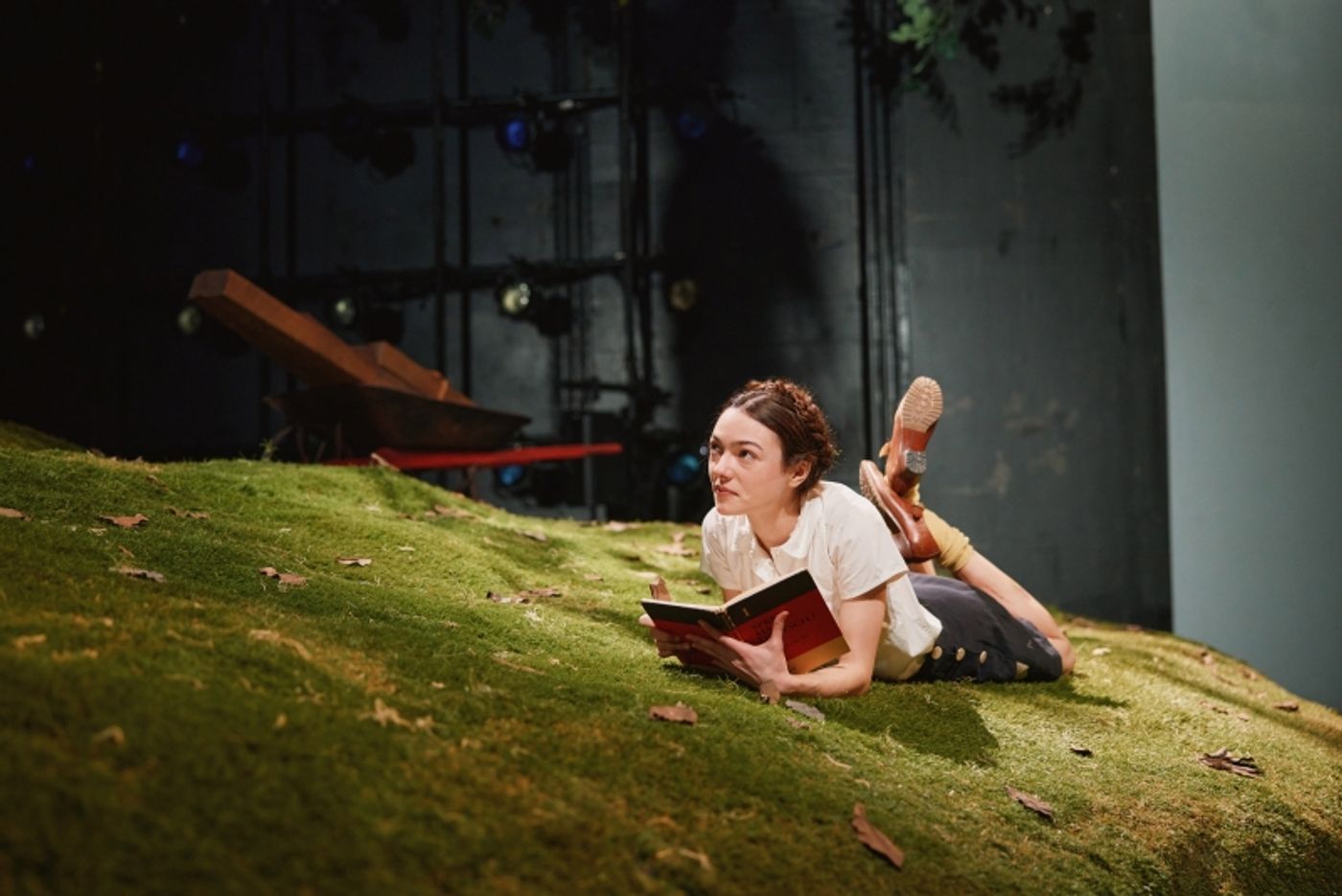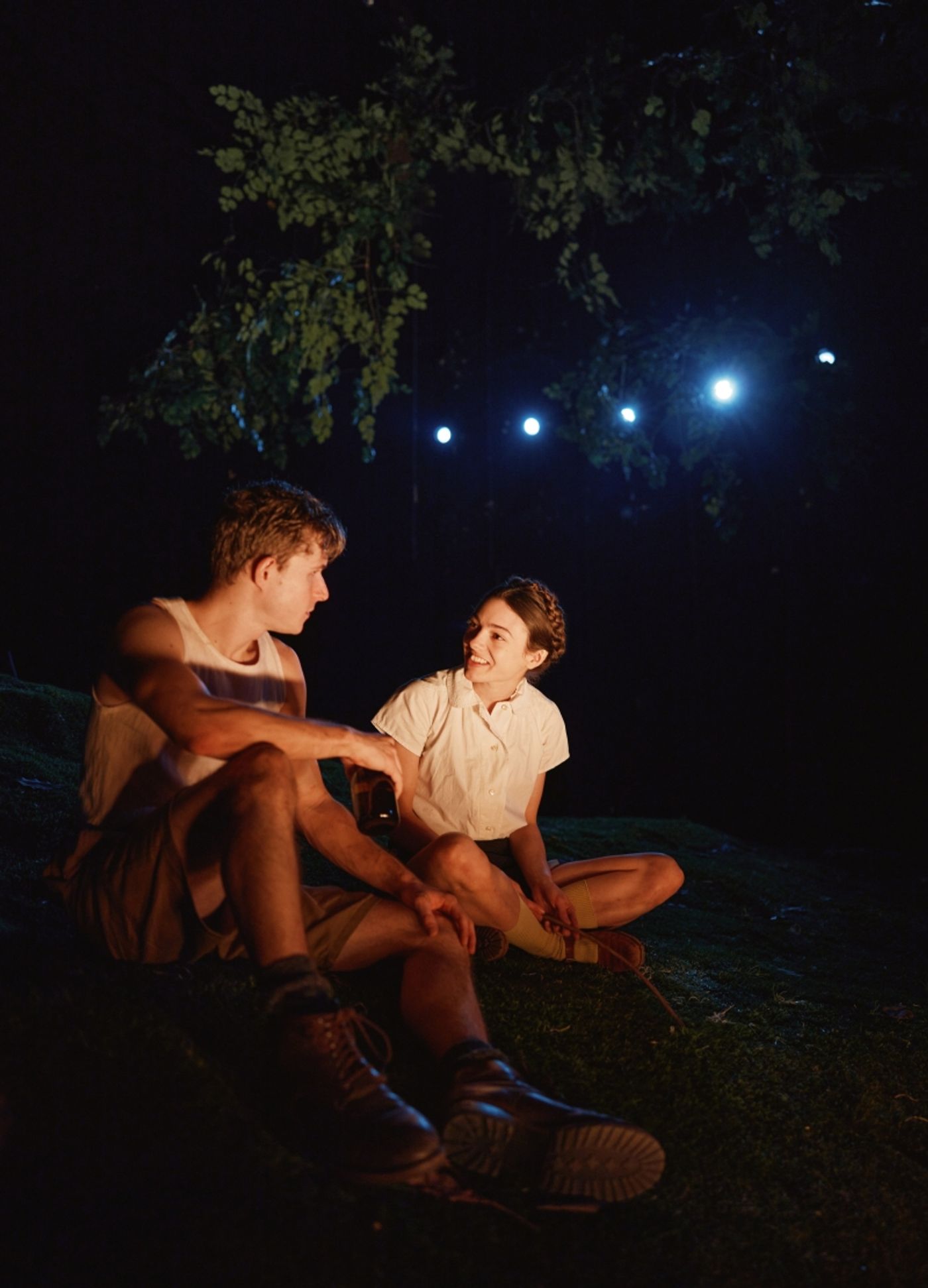Interview: CAMP SIEGFRIED's Lily McInerny Talks Transition From Screen to Stage in Her New York City Theater Debut
McInerny shares her process in developing her character, the research she did on the real-life Camp Siegfried, and more.

The New York Premiere of CAMP SIEGFRIED, the new play from Tony Award-nominee Bess Wohl (2ST's Grand Horizons and Make Believe), directed by Tony Award-winner David Cromer (The Band's Visit, 2ST's Man from Nebraska) officially opens tonight, Tuesday, November 15, 2022 at Second Stage's Tony Kiser Theater (305 West 43rd Street). The production stars Johnny Berchtold and Lily McInerny.
During a summer at the real-life Camp Siegfried on Long Island, two teenagers find themselves on a collision course with youthful passion and unbridled extremism. Are they falling in love or falling for something more sinister? Set on the cusp of World War II, this boy-meets-girl-meets-cautionary tale about the seductive nature of fascism reveals a shocking part of America's past and reminds us how easily darkness can sneak up on us.
BroadwayWorld spoke with Lily McInerny about the differences in preparing for the screen versus the stage, her process in developing the character, and much more.
This is your New York theater debut. What has the transition from TV and film to stage been like for you?
 Working with a director like David, who really values a kind of naturalistic, conversational tone, the biggest transition has really just been in my voice work with my vocal coach Gigi Buffington. And finding a place where I can approach the work almost the same way I would a piece for the camera, but having it be clear, and having it be understandable for everyone in the room. My approach isn't all that different, I guess the biggest difference that I found, and one of my favorite parts of working on stage, is the ability to dive into it so completely, and so intensely. I really like that kind of approach to my work that's sort of a slow burn versus a quick burst, and something that I can commit to completely for a set period of my year. So, that's my favorite part of it so far, I love going in all the way.
Working with a director like David, who really values a kind of naturalistic, conversational tone, the biggest transition has really just been in my voice work with my vocal coach Gigi Buffington. And finding a place where I can approach the work almost the same way I would a piece for the camera, but having it be clear, and having it be understandable for everyone in the room. My approach isn't all that different, I guess the biggest difference that I found, and one of my favorite parts of working on stage, is the ability to dive into it so completely, and so intensely. I really like that kind of approach to my work that's sort of a slow burn versus a quick burst, and something that I can commit to completely for a set period of my year. So, that's my favorite part of it so far, I love going in all the way.
One of the most intimidating parts of approaching my New York City theater debut was the feeling of anything can go wrong and you only get that one shot at it! But I quickly realized that although there is that added sense of anxiety before you step on stage, it's also a very forgiving medium because you have so many more opportunities to try it again and approach it in a slightly subtly different way, or drastically different way depending on how you feel. That's the kind of opportunity a day on set doesn't always provide. Once you get it in the can you can't go back in the editing room and say, "Hey guys, can we do that one more time?"
Another difference is the athleticism of it all! Camp Siegfried is an especially physical play because one of the practices the original camp used in gradually indoctrinating campers was to physically exhaust them through manual labor and sleep deprivation. A surprising takeaway for me has been to really take care of my body, prioritizing my health and rest.
Can you tell me about your role in Camp Siegfried?
I play She. None of the characters have names, which I think is really brilliant of Bess, I don't think they need them, I think you get to know them quite intimately with very little exposition from the get-go. She is a 16-year old from Baltimore, going to her first summer at Camp Siegfried. Whereas my co-star Johnny, his character has been attending the camp for several years and is a little further into the ideology of the camp.
How has it been working opposite Johnny Berchtold?
It's been so incredible. It's his New York City theater debut as well, which, you wouldn't be able to tell, he's so confident and so clear in all the choices he makes, and he's such a sweet and gentle soul, which is a testament to his ability as an actor, handling some of those really difficult and intense scenes. He's just been such a calming presence in this process, and I'm so grateful for the little community we've built behind the scenes. It's a really great time.
What's the process been like in finding this character and developing her from when you first read the script to now?
One of the first things I always start with when approaching a role, even in the very first audition, is starting a playlist of songs that kind of evoke a certain aspect of their personality, or the world that we're in. So, I've been building my 'She' playlist ever since I first saw the script, and that's something I now fall back to whenever I am doing character work. So that's really helpful.
Not only is this my New York City theater debut, but this is also my first time working on a period piece, and being able to use so many resources from the time, and especially specifically from Camp Siegfried, whether it be stock footage that's available online, or brushing up on current events of the era. And also just diving further into the history of antisemitism in America, and more specifically our own backyard, Camp Siegfried is only about an hour's drive from Second Stage itself, so diving into the history of the camp and of WWII in general has also really helped me get a clearer understanding of where my character might be coming from when she first steps into the camp.
What has been the most surprising thing about making your New York City stage debut so far?
Oh my goodness, what's the most surprising, and also the most magical, is the changes in the audiences reactions from night to night. Being able to feel the breath or the lack thereof, the moments where the audience holds their breath, or the moments where the audience laughs versus cringes, all of that is so variable, and so wonderful, and so ephemeral, and something you can never get anywhere besides theatre. And that's also why I love attending the theater so much, that electricity in the air. It's also so exciting to be working on a new play that has gone through so much development, and so many subtle but significant changes throughout this process. Getting to work with Bess, and watching her creativity work in real time, and getting new adjustments has been so cool. It's so special, I'm so grateful to be a witness to it.
Do you have anything else you'd like to share?
Just how grateful I am to be a part of this, and how although I think the play can be kind of uncomfortable at times, I think that's what's so important about it. And how much I respect Bess and David and the choices that they make, and the unflinching way that they are representing this complicated and ugly history in a local community. It's a once in a lifetime opportunity that I'm so enormously grateful to be a part of.
Powered by
|
Videos

